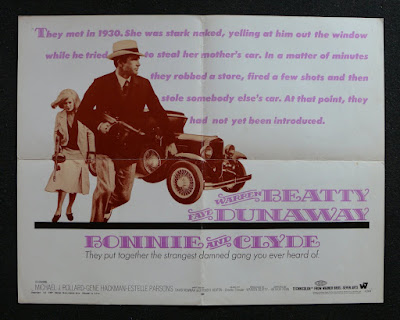Bonnie and Clyde (1967) Directed by Arthur Penn

Nick :
As I've been feeling ill (flue again!) and it was a long tiring day, we decided to watch something a bit more entertaining. Of course Bonnie & Clyde has been proclaimed the movie that changed American cinema forever. The violence and sexual content of Bonnie & Clyde ushered in a new mentality in American film that would bear richer fruits than this in the early 70's. Bonnie & Clyde was also seen as an American answer to the new, radical European Cinema, especially the French New Wave. It's influence in a large context has been big.
What's interesting watching Bonnie & Clyde now is how quaint and traditional the film seems. Yes, the violence is of a Peckinpah stylized variety. The sexual subtext (Clyde's impotency), is of course cured by the film's end. But the storytelling is so Hollywood, it's hard to believe this film was so shocking at the time. Beatty seems miscast as Clyde, he's surely too intelligent to be playing such a hick? Dunaway looks great, but like the whole film there is little depth to her performance. One can dream of Belmondo and Bardot as the lead actors and how dirty, dangerous and seedy that would have been. Penn inserts some documentary style scenes that keep things real while Gene Hackman and the very cool Michael J. Pollard take the acting plaudits.
Yes, this does romanticize Bonnie & Clyde in such a lighthearted way that nothing bad they do is that bad and perhaps that's the biggest influence of the film. It's OK to root for the bad guy. Still, Bonnie & Clyde is a watchable blast of an action movie. It was a lot of fun revisiting this landmark movie.
Astrid:
Having seen Bonnie and Clyde a couple times before, I wanted to watch it now as I have just read about it in Peter Biskind's Easy Riders, Raging Bulls. Without knowing about its history and standing (it marks the beginning of New Hollywood), this film has seemed odd to me:
A very conventional representation of the South, an idealization of two young bank robbers without much of a story, very much style and little else... All the while Nick has been going on to me how this is an amazing piece of cinema, thus adding to the sense that I should appreciate it more.
This time my experience was set by what I had been reading. I was watching Warren Beatty (with a way too tanned and sweet look) who had fought with the old Hollywood to make this film happen. I could see the massive influence of Goddard's Pierrot Le Fou, and how it needed to be
translated into Hollywood terms to ever turn into Bonnie and Clyde. Beatty's character Clyde is so one-sided in the end that all I know about him is his struggled to have hetero sex. I also know that at one stage of scripting the film there was going to be a strong third male party in the film and a ménage à trois. This idea was too much for Beatty, and thus we end up with the on-going theme of impotence and its unnecessary ending on a field with a happy Bonnie and an extatic Clyde asking if it was any good. Why? This is the kind of conventionalism that spoils much of the fun and closes possibilities for more versatile interpretations.
Something important disappears in this Hollywood watering down of the French New Wave. Bonnie and Clyde feels paper thin because of its need to follow a linear storyline, and because of its conventional solutions to questions of sexuality and gender. It seems that after getting the audience to sympathize with the bank robbers the film does not know where to chuck that sympathy. There is no use for it because there is no emotional content. But oh, does the surface gleam and shine. I love Bonnie in her beret forever.










Comments
Post a Comment